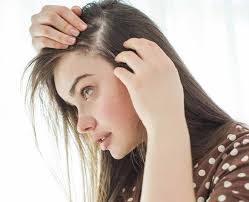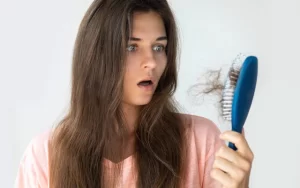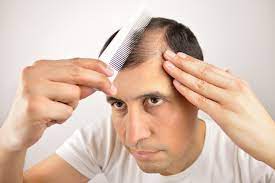
To stop hair fall, its causes, tips, and treatments. Use gentle shampoos, avoid heat styling, maintain a balanced diet, and consider treatments like minoxidil.
Hair fall, also known as hair loss or alopecia, can have various causes and can affect both men and women.
Here are some common causes, tips, and treatments to help stop hair fall:
What is hair fall?


Hair fall, also known as hair loss or alopecia, is a condition where hair begins to thin or shed from the scalp and other parts of the body.
It is a natural part of the hair growth cycle, where old hair falls out to make way for new hair to grow.
However, excessive or abnormal hair loss can be a concern, leading to visible thinning of the hair or even baldness.
Hair fall can be caused by various factors, including genetics, hormonal changes, medical conditions, medications, stress, nutritional deficiencies, and certain hairstyling practices.
The severity and pattern of hair fall can vary from person to person.
Hair fall is a common issue that can affect both men and women, and its treatment and management depend on identifying the underlying cause.
Some people may experience temporary hair loss due to factors like stress or a nutritional deficiency. In contrast, others may deal with more persistent and hereditary forms of hair loss, such as male or female pattern baldness.
Managing and treating hair fall often involves addressing underlying causes, making lifestyle changes, using hair care products and treatments, and sometimes consulting a medical professional or dermatologist for tips and specialized interventions.
The goal is to slow down or stop excessive hair fall and, in some cases, promote hair regrowth.
Hair fall can affect individuals of all ages and genders and can be caused by a variety of factors.
Symptoms of Hair Fall:
Hair fall, also known as hair loss or alopecia, can manifest in various ways, and the symptoms can differ from person to person.
Some common symptoms and signs of hair fall include:
Increased Hair Shedding:
You may notice excessive hair falling out during activities like brushing, shampooing, or simply running your fingers through your hair.
Thinning Hair:
Gradual thinning of the hair, especially on the top of the scalp or in the crown area, is a common sign of hair loss. Hair may appear less dense or see-through in these areas.
Receding Hairline:
In men, receding hairlines are often one of the earliest signs of male pattern baldness (androgenetic alopecia). The hairline recedes, typically at the temples or forehead.
Bald Spots:
Some people may develop small, round bald patches on the scalp. This type of hair loss is known as alopecia areata and can occur suddenly.
Excessive Hair on Pillows or Shower Drains:
Finding an unusual amount of hair on pillows, towels, or shower drains can be a sign of hair loss.
Visible Scalp:
As hair thins, more of the scalp may become visible, especially in well-lit conditions.
Itching or Irritation: Hair loss can sometimes be accompanied by itching or discomfort on the scalp.
Changes in Hair Texture:
Hair affected by hair loss may become finer, weaker, or more brittle in texture.
Psychological Impact:
Hair loss can have emotional and psychological effects, leading to stress, anxiety, and a decrease in self-esteem.
Excessive Hair in Comb or Brush:
After combing or brushing your hair, you may notice an unusual amount of hair left behind in the comb or brush.
It’s important to understand that some degree of hair shedding is normal, and everyone loses a certain amount of hair each day as part of the natural hair growth cycle.
However, if you notice a significant increase in hair fall or are concerned about hair loss, it’s advisable to consult with a dermatologist or healthcare professional.
They can help determine the underlying cause of your hair loss and recommend appropriate treatments or lifestyle changes to address the issue.
Common causes of hair loss include genetics, hormonal imbalances, medical conditions, medications, and stress, among others, so a thorough evaluation is essential for an accurate diagnosis and treatment plan.
What are the causes of hair fall?
Hair fall, also known as hair loss or alopecia, can have various causes, both temporary and long-term.
Here are some common causes of hair fall:
Genetics: Hereditary factors play a significant role in hair loss. If you have a family history of baldness or thinning hair, you may be more susceptible to it.
1. Hormonal Changes:
Hormonal imbalances can lead to hair loss. This includes conditions like pregnancy, childbirth, menopause, thyroid disorders, and hormonal fluctuations associated with certain medications or medical conditions.
2. Medical Conditions:
Certain medical conditions can contribute to hair loss, including alopecia areata (an autoimmune disorder), scalp infections (like ringworm), and chronic illnesses.
3. Medications:
Some medications have hair loss as a side effect. These may include drugs used for cancer treatment, blood thinners, and medications that affect hormones.
4. Nutritional Deficiencies:
A lack of essential nutrients, such as iron, biotin, vitamin D, and protein, can weaken hair follicles and lead to hair fall.
5. Stress:
High levels of physical or emotional stress can cause a condition called telogen effluvium, which leads to hair shedding.
6. Hairstyling Practices:
Excessive use of heat styling tools (like hair dryers and straighteners), tight hairstyles that pull on the hair (such as tight ponytails or braids), and harsh chemical treatments can damage the hair and contribute to hair loss.
7. Age:
As people age, hair naturally tends to become thinner and may fall out more easily.
8. Autoimmune Conditions:
Some autoimmune diseases can target hair follicles, leading to hair loss. This includes conditions like lupus.
9. Weight Loss:
Rapid or extreme weight loss, as well as crash diets, can lead to temporary hair loss.
10. Menopause:
Hormonal changes during menopause can result in hair thinning and hair fall in women.
11. Traction Alopecia:
This type of hair loss occurs when constant pulling and tension on the hair follicles, often due to tight hairstyles, damages the follicles over time.
Understanding the specific cause of your hair fall is crucial for developing an appropriate treatment plan.
If you are experiencing significant or prolonged hair loss, it’s advisable to consult a healthcare professional or dermatologist.
They can evaluate your condition, identify the underlying cause, and recommend suitable treatments or lifestyle changes to address the issue.
The severity and pattern of hair fall can vary from person to person, and treatment options depend on the underlying cause.
In some cases, hair fall may be temporary and reversible, while in others, it may be a chronic and progressive issue.
Managing and treating hair fall may involve lifestyle changes, the use of topical treatments or medications, dietary adjustments, and, in some cases, medical procedures like hair transplant surgery.
If you are experiencing a significant hair fall and it is a concern for you, it is advisable to consult a healthcare professional or dermatologist for a proper evaluation and personalized treatment plan.
Tips and treatments to Prevent Hair Fall:
Controlling hair fall involves adopting good hair care practices and making lifestyle changes to address potential contributing factors.
Here are some tips to help you control hair fall:
Maintain a Healthy Diet:
Ensure your diet includes a variety of nutrients like vitamins, minerals, and proteins that promote hair health.
Foods rich in biotin, iron, vitamin D, and omega-3 fatty acids can be particularly beneficial.
Consume a balanced diet with plenty of fruits, vegetables, lean proteins, and whole grains.
Consider taking supplements if you have nutritional deficiencies.
Gentle Hair Care:
Use a mild, sulfate-free shampoo and conditioner that suits your hair type.
Avoid frequent washing, as it can strip natural oils from your scalp.
Be gentle while washing your hair, and use your fingertips to massage the scalp rather than your nails.
Avoid hot water for hair washing, as it can strip moisture and make hair brittle.
Avoid Heat Styling:
Limit the use of heat-styling tools such as hair dryers, straighteners, and curling irons.
When you do use them, use the lowest heat setting possible.
Apply a heat protectant product before using heat styling tools to minimize damage.
Protect Your Hair:
Be mindful of hairstyles that pull on the hair, like tight ponytails or braids.
These can lead to breakage and hair loss, known as traction alopecia.
Use a wide-toothed comb or a detangling brush to prevent hair breakage when combing or brushing.
Scalp Health:
Keep your scalp clean and free from excess oil and buildup by washing it regularly.
A clean scalp promotes healthier hair growth.
Consider using a clarifying shampoo occasionally to remove product residue and excess oils.
Stress Management:
Practice stress-reduction techniques such as meditation, yoga, deep breathing exercises, or hobbies that help you relax.
Chronic stress can contribute to hair fall, so finding ways to manage stress is crucial.
Stay Hydrated:
Drink an adequate amount of water to keep your body and scalp hydrated. Dehydration can affect hair health.
Avoid Tobacco and Excessive Alcohol:
Smoking and excessive alcohol consumption can hurt hair health. Quitting smoking and reducing alcohol intake can improve hair condition.
Avoid Tight Headgear:
If you frequently wear hats or helmets, make sure they are not too tight, as this can put pressure on your hair and scalp.
Regular Exercise:
Regular physical activity promotes good blood circulation, which can benefit hair follicles and overall hair health.
Consult a Professional:
If your hair fall is severe, persistent, or accompanied by other related symptoms, consult a dermatologist or healthcare provider for its causes, tips on how to prevent hair loss, a complete diagnosis, and recommended treatments.
Remember that hair loss can have various underlying causes, and what works for one person may not work for another. Identifying and addressing the specific cause of your hair fall is essential for effective management and prevention.
Avoid Tight Hairstyles:
Avoid hairstyles that pull on your hair, such as tight ponytails or braids.
Be Gentle with Your Hair:
Use a wide-toothed comb, be gentle while detangling wet hair, and minimize heat styling.
Use Mild Shampoos:
Choose shampoos and conditioners that are gentle on your hair and scalp. Avoid those with harsh chemicals.
Avoid Excessive Heat:
Limit the use of hot tools like hair dryers, straighteners, and curling irons. Use them on the lowest heat setting.
Manage Stress:
Practice stress-reduction techniques such as yoga, meditation, or deep breathing exercises.
Scalp Care:
Keep your scalp clean and healthy. Regularly massage your scalp to stimulate blood circulation.
Hair Fall Treatments:
Over-the-counter (OTC) Products: There are various OTC products like minoxidil (Rogaine) that can help slow down hair loss and promote regrowth.
Prescription Medications:
Your healthcare provider may prescribe medications like finasteride (Propecia) for male pattern baldness or other specific treatments based on the underlying cause.
Hair Transplant:
In cases of advanced hair loss, hair transplant surgery can be an option to transplant hair follicles from one part of your body to another.
Laser Therapy:
Low-level laser therapy devices can stimulate hair follicles and promote hair growth.
Platelet-Rich Plasma (PRP) Therapy: PRP injections involve drawing your blood, processing it to concentrate platelets, and injecting it into your scalp to promote hair growth.
Lifestyle Changes:
Make healthy lifestyle choices, including a balanced diet, regular exercise, and adequate sleep, to support overall health and hair growth.
It’s essential to consult with a healthcare provider or dermatologist to determine the underlying cause of your hair loss and develop a personalized treatment plan. Hair loss can be a complex issue, and the most effective treatment may vary from person to person.
What are the natural tips and treatments for hair fall?
Natural remedies for hair fall can be a valuable addition to your hair care routine, especially when used in conjunction with other preventive measures and treatments.
Remember that results may vary from person to person, and it’s essential to be patient and consistent when trying natural remedies for hair fall.
Here are some natural remedies that you can consider:
Scalp Massage:
Regularly massaging your scalp can help improve blood circulation to the hair follicles, promoting hair growth.
You can use oils like coconut, olive, or almond oil for a soothing scalp massage.
Aloe Vera:
Aloe vera gel has soothing and moisturizing properties. Applying aloe vera gel to your scalp and hair can help reduce dandruff and promote a healthy scalp environment.
Onion Juice:
Onion juice contains sulfur, which may help stimulate hair growth. Blend an onion, extract the juice, and apply it to your scalp for about 15 minutes before shampooing.
Egg Mask:
Eggs are rich in protein, which is essential for hair growth. Create a hair mask by mixing eggs with a few drops of lemon juice and applying it to your hair and scalp for about 20 minutes before rinsing.
Green Tea:
Green tea contains antioxidants that may help prevent hair loss. Brew green tea, allow it to cool, and apply it to your scalp.
Leave it on for about an hour before rinsing.
Fenugreek (Methi) Seeds:
Fenugreek seeds are rich in proteins and nicotinic acid, which can help strengthen hair and promote hair growth.
Soak fenugreek seeds in water overnight, make a paste, and apply it to your scalp and hair. Leave it on for about 30 minutes before rinsing.
Coconut Milk:
Coconut milk is rich in essential fats and proteins that nourish hair and promote hair growth.
Apply coconut milk to your scalp and hair, leave it on for about 30 minutes, and then rinse.
Hibiscus:
Hibiscus flowers and leaves are known for their hair-strengthening properties.
Make a paste by grinding hibiscus leaves or flowers and apply it to your hair and scalp.
Leave it on for about 30 minutes before washing it out.
Amla (Indian Gooseberry):
Amla is rich in vitamin C and antioxidants, which can promote hair health.
You can apply amla oil to your scalp or consume amla in your diet.
Balanced Diet:
Ensure you’re getting a balanced diet rich in vitamins, minerals, and protein.
Nutritional deficiencies can contribute to hair fall, so include foods like leafy greens, nuts, seeds, and lean proteins in your diet.
Stay Hydrated:
Proper hydration is essential for healthy hair.
Drink plenty of water to keep your hair and scalp moisturized.
Reduce Stress: Practice stress-reduction techniques like meditation, yoga, or deep breathing exercises, as chronic stress can contribute to hair loss.
Remember that natural remedies may take time to show results, and consistency is key.
If your hair fall is severe or persists despite trying these treatments, you should consult a healthcare professional or dermatologist to identify any underlying causes and explore additional tips.







